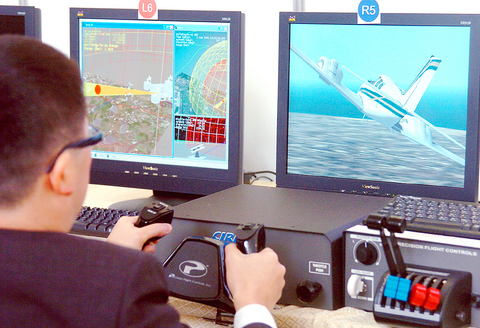Taiwan has never taken military support from other nations for granted, and the nation's defenses are designed to fight independently without relying on nations such as the US, a top Ministry of National Defense official said yesterday.
"The US has never promised to come to Taiwan's aid in the event of cross-strait hostilities. Nor has Taiwan anticipated such aid from the US, for we can never be sure if it would render us assistance," said General Hu Chen-pu (
Hu made the remarks during a press briefing held to show off the ministry's combat-maneuver training center. The event was also apparently aimed at promoting the ministry's arms procurement plan ahead of the legislative session that convenes on Feb. 21.

PHOTO: CHANG CHIA-MING, TAIPEI TIMES
In this regard, Hu said: "If possible, the government should bring the national defense budget to 3 percent of GDP and support the procurement of the three major weapons systems from the US by including them in the budget for fiscal year 2006."
The ministry would not rule out any options if there were a feasible substitute for the proposed package, Hu said, adding that "the major responsibility of the Ministry of National Defense is to conduct an assessment of what the nation's armed forces need to be equipped with. Besides, the ministry has carefully evaluated the type of weapons the nation needs and gained support from our allies."
According to the ministry's Integrated Assessment Office, China is expected to deploy more than 1,800 ballistic missiles by 2010. The total number of conventional and nuclear-powered submarines will also rise to 44 from 32 by 2008 before reaching 50 in 2015. The office believes that the cross-strait military balance will tilt in China's favor this year.
The office also said that the number of new Chinese warships reached 24 last year and that this will grow to 38 by 2015. China's navy is also expected to establish a fleet of aircraft carriers and claim naval and air supremacy in the Taiwan Strait by 2015.
Results of a computer analysis by the office suggested that the nation's armed forces need nine sets of Patriot Advanced Capability (PAC-3) missiles, 12 maritime- patrol aircraft and 10 submarines to deal with China's military threat.
To target weaknesses in China's People's Liberation Army and to maintain access to energy supplies, Taiwan must build its military strength to an extent that is capable of deterring invasion, ministry officials said.
In related news, China yesterday rejected a Pentagon report that singled out Beijing as the major power most likely to challenge the US' military supremacy and said it posed no threat to other countries.
The US' Quadrennial Defense Review released last week said China had the greatest potential to compete militarily with the US.
"The report interferes with China's internal affairs by groundlessly accusing China's normal national defense build-up," Chinese foreign ministry spokesman Kong Quan (孔泉) told a news conference.
"It also whips up a Chinese military threat and misleads public opinion," he said.
The review, outlining the Pentagon's strategy for meeting anticipated security threats in the next 20 years, said that the US would build new long-range weapons to counter potential rivals such as China.
also see story:
Ma pushes `status quo' in article

Taiwan yesterday denied Chinese allegations that its military was behind a cyberattack on a technology company in Guangzhou, after city authorities issued warrants for 20 suspects. The Guangzhou Municipal Public Security Bureau earlier yesterday issued warrants for 20 people it identified as members of the Information, Communications and Electronic Force Command (ICEFCOM). The bureau alleged they were behind a May 20 cyberattack targeting the backend system of a self-service facility at the company. “ICEFCOM, under Taiwan’s ruling Democratic Progressive Party, directed the illegal attack,” the warrant says. The bureau placed a bounty of 10,000 yuan (US$1,392) on each of the 20 people named in

The High Court yesterday found a New Taipei City woman guilty of charges related to helping Beijing secure surrender agreements from military service members. Lee Huei-hsin (李慧馨) was sentenced to six years and eight months in prison for breaching the National Security Act (國家安全法), making illegal compacts with government employees and bribery, the court said. The verdict is final. Lee, the manager of a temple in the city’s Lujhou District (蘆洲), was accused of arranging for eight service members to make surrender pledges to the Chinese People’s Liberation Army in exchange for money, the court said. The pledges, which required them to provide identification

Nine retired generals from Taiwan, Japan and the US have been invited to participate in a tabletop exercise hosted by the Taipei School of Economics and Political Science Foundation tomorrow and Wednesday that simulates a potential Chinese invasion of Taiwan in 2030, the foundation said yesterday. The five retired Taiwanese generals would include retired admiral Lee Hsi-min (李喜明), joined by retired US Navy admiral Michael Mullen and former chief of staff of the Japan Self-Defense Forces general Shigeru Iwasaki, it said. The simulation aims to offer strategic insights into regional security and peace in the Taiwan Strait, it added. Foundation chair Huang Huang-hsiung

’DISTORTION’: Beijing’s assertion that the US agreed with its position on Taiwan is a recurring tactic it uses to falsely reinforce its sovereignty claims, MOFA said The Ministry of Foreign Affairs (MOFA) yesterday said Chinese state media deliberately distorted Taiwan’s sovereign status, following reports that US President Donald Trump agreed to uphold the “one China” policy in a phone call with Chinese President Xi Jinping (習近平). During the more than one-hour-long call, Xi urged Trump to retreat from trade measures that roiled the global economy and cautioned him against threatening steps on Taiwan, a Chinese government summary of the call said. China’s official Xinhua news agency quoted Xi as saying that the US should handle the Taiwan issue cautiously and avoid the two countries being drawn into dangerous